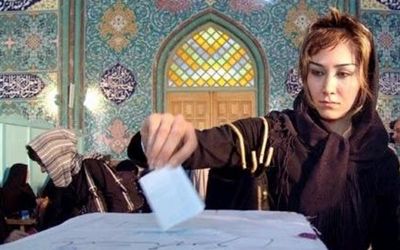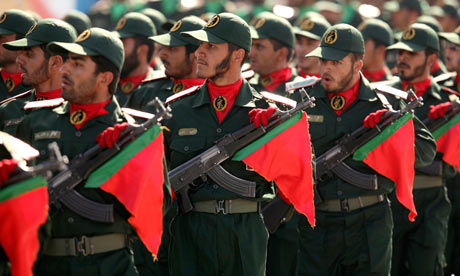 With the Iranian elections approximately a month
away, casual observers are all-too-quickly heralding the downfall of the Ayatollah
and his economically "ruined" Islamic Republic. The combined optimism
ushered in by the "Green Movement" and a poor understanding of the
dynamic Iranian state have eclipsed their attention to reason and reality. Many overlook the
capacity of the Iranian government to use what little oil money they are still
able to generate to continue buying the loyalty of portions of the middle class
and the Revolutionary Guard. Though Western sanctions have had a crippling
effect on the Iranian state, they have not wholly eliminated Iran’s oil exports
nor its ability to buy off the loyalty of its people. The Ayatollah’s economic maneuverability
is being choked, but not asphyxiated...yet.
With the Iranian elections approximately a month
away, casual observers are all-too-quickly heralding the downfall of the Ayatollah
and his economically "ruined" Islamic Republic. The combined optimism
ushered in by the "Green Movement" and a poor understanding of the
dynamic Iranian state have eclipsed their attention to reason and reality. Many overlook the
capacity of the Iranian government to use what little oil money they are still
able to generate to continue buying the loyalty of portions of the middle class
and the Revolutionary Guard. Though Western sanctions have had a crippling
effect on the Iranian state, they have not wholly eliminated Iran’s oil exports
nor its ability to buy off the loyalty of its people. The Ayatollah’s economic maneuverability
is being choked, but not asphyxiated...yet.
The Iranian government has equitably balanced
their use of their oil revenues to produce both a visible “rentier effect” and “suppression
effect.” This use of oil money has thus far proved effective at limiting the expression
of public dissatisfaction and cries for regime change, especially since the
eruption of the Green Movement in 2009.
Traditionally, the
rentier effect is best defined as the use of oil revenue to circumvent the
necessity for taxation or to provide free social services and funding to the
population, essentially buying off popular loyalty and allowing authoritarian governments
to operate freely. In Iran, taxation is
not eliminated altogether, but income and sales tax rates are relatively low, hovering around 25
to 1.5 percent, respectively. Additionally, it is estimated that approximately 60 percent of all taxable sources of revenue are
actually not collected on a regular basis in Iran. Certain levels of the
military and the middle class are allowed to avoid paying taxes in exchange for
their explicit political loyalty.
 Beyond the issue of taxation and the “rentier effect,” however, lies the “suppression effect” that is best exemplified by the Iranian government’s recent
campaign of privatization. Since the outbreak of popular protests in 2009, the
Iranian privatization campaign has conservatively placed 60 percent of the entire Iranian economy in
the hands of the Revolutionary Guard. In 2008, the Ayatollah announced a
campaign of privatization that had initially been largely successful in terms
of decreasing the breadth of the public sector. In light of the Green Movement,
however, this privatization campaign was re-purposed, focusing instead on the transfer
much of these formerly state-held businesses and agencies into the hands of the
Revolutionary Guard. This has in effect bought off the loyalty of the
para-military group and simultaneously given them a much larger stake in the maintenance
of the status-quo. Should more protests break out following the 2013
presidential elections, the Revolutionary Guard's loyalty should ostensibly remain with the
ruling conservative establishment. Any threat to their economic supremacy would therefore be violently expunged.
Beyond the issue of taxation and the “rentier effect,” however, lies the “suppression effect” that is best exemplified by the Iranian government’s recent
campaign of privatization. Since the outbreak of popular protests in 2009, the
Iranian privatization campaign has conservatively placed 60 percent of the entire Iranian economy in
the hands of the Revolutionary Guard. In 2008, the Ayatollah announced a
campaign of privatization that had initially been largely successful in terms
of decreasing the breadth of the public sector. In light of the Green Movement,
however, this privatization campaign was re-purposed, focusing instead on the transfer
much of these formerly state-held businesses and agencies into the hands of the
Revolutionary Guard. This has in effect bought off the loyalty of the
para-military group and simultaneously given them a much larger stake in the maintenance
of the status-quo. Should more protests break out following the 2013
presidential elections, the Revolutionary Guard's loyalty should ostensibly remain with the
ruling conservative establishment. Any threat to their economic supremacy would therefore be violently expunged. This system of bribery is unsustainable under the weight of increasing economic sanctions, however, and the Iranian government will soon need to make a decision to cut either its incredibly costly nuclear program or its capacity to buy off the influential sectors of the Iranian populous. It is unlikely that the Iranian economy will be at this imminent decision point by the beginning of the next elections, however. Regime change is certainly on the horizon, but not yet.

This is interesting because I did not know Iran has such low amounts of revenue coming from oil compared to other MENA regions. As we know, once the oil money runs out in countries like Iran, it will definitely lead to the people beginning to rebel. If Iran does not have the money to keep their people's dissatisfaction repressed, the taxes that Iran will have to create will create much discontent that could cause conflicts to arise within the country. I was also surprised that Iran puts 60 percent of their economy in their military groups to keep people from protesting and rioting, and one can easily see that this a huge plunder if the military was to defect or fall due to public mobilization or government corruption. If the military is lost then not only will people not stay calm anymore but the economy will be destroyed in Iran. I cannot believe Iran went as far to put businesses and government agencies in the hand of the military guard as well. I can foresee that since Iran is grouping all their money and vital government groups and business with one entity that could easily be lost or turn on the government, they are just inviting the possibility for regime collapse when something happens with the citizens such as taxes due to loss of oil money. Like many of the countries that have faced failure and destruction in the Arab spring, Iran sees to have a similar gloomy future. Iran's military is basically the sole protector of the status quo as stated in the article and that is frightening after seeing what happened to the military in countries like Libya and Syria in recent times. I agree with the prospect that Iran will have regime change soon which might the best thing since the current regime is making such poor choices. The only decision that looks good for the current Iran government is cutting their nuclear problem which could relieve some pressure on the economy, but looking into the future I see regime fall and conflict coming soon, its just a ticking time bomb which depends on the people and resources.
ReplyDeleteIran spends most of their money on their nuclear program, which is one of the leading causes to the country falling under the resource curse and the rentier affect. The UN has placed many sanctions economically and specifically on their nuclear weapons program. They continue to blame the international community as a cause of hinderance to their economy. It's an ongoing process that makes me wonder what the international community is doing wrong. They clearly live in corruption even with attempts at a democracy and fair elections. It seems like Iran has gone through the most with American intervention and the UN, but they are destined for a protest and revolution in the coming years.
ReplyDelete